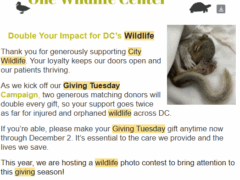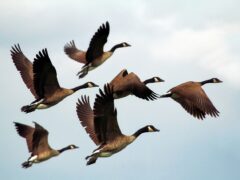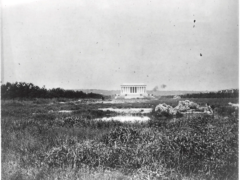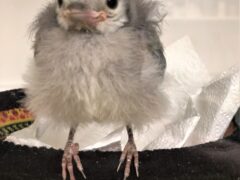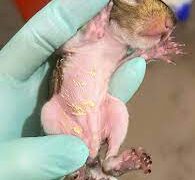Thank you for generously supporting City Wildlife. Your loyalty keeps our doors open and our patients thriving. As we kick off our Giving Tuesday Campaign, two generous matching donors will double every gift, so your support goes twice as far for injured and orphaned wildlife across DC. If you’re able, please make your Giving Tuesday gift [Read More …]
Reimagining Rodent “Control”
In this webinar, two pioneering scientists, Dr. Rebecca Gooley and Dr. Loretta Mayer, discuss the current state and future of rodent population management. Learn about the widespread ecological harm of rodenticide, emerging legislative change to mitigate the harm of these poisons, and the exciting potential of new technology like fertility [Read More …]
Bird Flu (Highly Pathogenic Avian Influenza/HPAI) found in Mid-Atlantic Geese
Background: Highly pathogenic avian influenza (HPAI) has been found in poultry in all 50 states, and intermittently on the East Coast, with recent detections in geese in Pennsylvania, Delaware, and Maryland. Simply being outside where wild birds have been is generally considered low risk, but we must take precautions to minimize interacting [Read More …]
The District’s Amazing Biodiversity
by Sara Dollen, City Wildlife The District of Columbia’s compact urban environment might not seem like a haven for nature, except for pigeons, squirrels, starlings, and rats. But in fact, Washington, DC is home at least 390 vertebrate species and thousands of invertebrate species, according to the District’s Department of Energy and [Read More …]
I found a baby bird! What do I do next?
The first thing to keep in mind is that baby birds, along with all other types of wild animals, have the very best chance of survival when left to be raised by their own parents. We wildlife rehabbers certainly try our best to raise orphans when there truly are no parents, but ultimately we can never recreate the lessons that an animal parent can [Read More …]
The Wonderful World of Bats!
Bats need our help now more than ever! A recent report determined that over 50% of our native bats are considered at risk. Besides adding diversity and flair to local wildlife, our bats consume countless pest insects every single night. These nocturnal neighbors need our help now more than ever. Bat Conservation International's Community Engagement [Read More …]
Urban Nature and Humane Health and Well-Being
In the minds of many people, urban areas and natural landscapes are considered to be mutually exclusive opposites. For city dwellers to experience nature, they have to leave the cities behind them and make a trek out to the country. But it is now becoming apparent that not only is it possible to have urban landscapes that afford people who live [Read More …]
Re-Nesting Baby Eastern Gray Squirrels
Baby wild animals have the best chance to survive and thrive when under the care of their parents. Wildlife rehabbers do all they can to care for and raise orphaned animals when no other options are available, but a rehabber should always be a last resort. However, a squirrel should be brought immediately to a licensed wildlife rehabilitator if [Read More …]
Restoring the darkness that restores the world
“How insupportable would be the days, if the night with its dews and darkness did not come to restore the drooping world.” Henry David Thoreau The hours when the earth is dark are frequently thought of as a time when not much of significance happens. But as certain Indigo Buntings demonstrated in the 1960s, that isn’t really true. It was known [Read More …]
From Rescue to Release: A Behind-the Scenes Look at Wildlife Rehabilitation
City Wildlife Clinic Director Dr. Sarah Sirica presents a behind-the-scenes look at what happens with wild animals after they are dropped off at our center. Using videos and photos taken during the course of our work, she demonstrates how we perform physical examinations, treat common injuries and illnesses, and care for patients, large and small, [Read More …]
- 1
- 2
- 3
- …
- 10
- Next Page »
